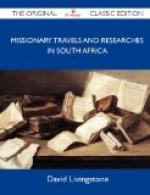On the evening of the day in which Manenko arrived, we were delighted by the appearance of Mosantu and an imposing embassy from Masiko. It consisted of all his under-chiefs, and they brought a fine elephant’s tusk, two calabashes of honey, and a large piece of blue baize, as a present. The last was intended perhaps to show me that he was a truly great chief, who had such stores of white men’s goods at hand that he could afford to give presents of them; it might also be intended for Mosantu, for chiefs usually remember the servants; I gave it to him. Masiko expressed delight, by his principal men, at the return of the captives, and at the proposal of peace and alliance with the Makololo. He stated that he never sold any of his own people to the Mambari, but only captives whom his people kidnapped from small neighboring tribes. When the question was put whether his people had been in the habit of molesting the Makololo by kidnapping their servants and stealing canoes, it was admitted that two of his men, when hunting, had gone to the Makololo gardens, to see if any of their relatives were there. As the great object in all native disputes is to get both parties to turn over a new leaf, I explained the desirableness of forgetting past feuds, accepting the present Makololo professions as genuine, and avoiding in future to give them any cause for marauding. I presented Masiko with an ox, furnished by Sekeletu as provision for ourselves. All these people are excessively fond of beef and butter, from having been accustomed to them in their youth, before the Makololo deprived them of cattle. They have abundance of game, but I am quite of their opinion that, after all, there is naught in the world equal to roast beef, and that in their love for it the English show both good taste and sound sense. The ox was intended for Masiko, but his men were very anxious to get my sanction for slaughtering it on the spot. I replied that when it went out of my hands I had no more to do with it. They, however, wished the responsibility of slaughtering it to rest with me; if I had said they might kill it, not many ounces would have remained in the morning. I would have given permission, but had nothing else to offer in return for Masiko’s generosity.
We were now without any provisions except a small dole of manioc roots each evening from Nyamoana, which, when eaten raw, produce poisonous effects. A small loaf, made from nearly the last morsel of maize-meal from Libonta, was my stock, and our friends from Masiko were still more destitute; yet we all rejoiced so much at their arrival that we resolved to spend a day with them. The Barotse of our party, meeting with relatives and friends among the Barotse of Masiko, had many old tales to tell; and, after pleasant hungry converse by day, we regaled our friends with the magic lantern by night, and, in order to make the thing of use to all, we removed our camp up to the village of Nyamoana. This is a good means of arresting the attention, and conveying important facts to the minds of these people.




